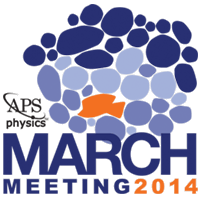December 2013
In this issue:
- Message from the Chair
- APS March 2014 Meeting Deadlines
- March 2014 Meeting DCP Focus Sessions
- Remembering Moshe Shapiro
- APS March Meeting Child Care and Travel Awards
- Congratulations to APS Prize Winner
- DCP Election of 2014-15 Officers
- Congratulations to 2013 APS Fellows
- Fellowship Committee and Nominations
- DCP Membership
- Upcoming Conferences of Possible Interest to DCP Membership
Message from the Chair
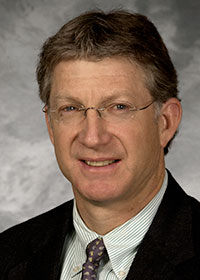
I am delighted to report that DCP is healthy and vibrant! The current Executive Committee is working hard to promote the activities of the Division. Program Chair Gil Nathanson has put together a spectacular scientific program for the March meeting (see below), and our new Secretary/Treasurer Robert Gordon has been tireless in interfacing with APS and whipping the Division into shape. Below we congratulate our 2014 APS Plyler prizewinner, the new 2014 APS DCP Fellows, and the newly elected members of our Executive Committee. I also take this opportunity to thank our outgoing Executive Committee members, Past Chair Don Truhlar and Member-at-Large David Jonas, for their significant efforts in running and contributing to the Division.
I strongly encourage all DCP members to take advantage of the activities of the Division. In particular, Gil's excellent March meeting scientific program has generated a record number of contributed abstracts, and so the meeting (held in Denver, March 3-7, 2014) promises to be a rousing success. I strongly encourage you to attend the meeting (see registration and housing deadlines below), and to send your students and postdocs. We also encourage students to join APS and DCP — the first year for each is free!
Please join with me in increasing the visibility, activity, and intellectual strength of DCP! Thanks!
Jim Skinner
DCP Chair
APS March 2014 Meeting Deadlines
Early Registration Deadline (lowest fees): 3 Jan 2014
Post Deadline Abstract Submission: 10 Jan 2014
APS DCP March Meeting Dependent Child Care Award: 28 Jan 2014
Online Registration Deadline (higher fees): 31 Jan 2014
Hotel Registration Deadline: 7 Feb 2014
APS March 2014 Meeting DCP Focus Sessions
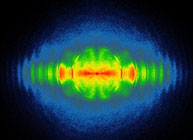
05.1.1 Quantum Control of Molecular, Nano, and Plasmonic Materials
Co-Organizers: Robert Gordon, University of Illinois at Chicago (rjgordon@uic.edu), and Maxim Sukharev, Arizona State University (maxim.sukharev@asu.edu)
Quantum control utilizes the coherent interaction of light and matter to control a broad range of phenomena from the atomic to the mesoscopic scales. This focus session brings together chemists and physicists with interest in coherent responses of matter to photoexcitation, such as chemical reactivity and carrier dynamics, as well as optics of hybrid systems comprised of ensembles of molecules optically coupled to plasmonic materials. Both experimental and theoretical advances will be emphasized.
Phil Bucksbaum (Stanford University)
Regina de Vivie-Riedle (Ludwig-Maximilians University, Munich)
Christoph Lienau (Carl von Ossietzky University of Oldenberg, Germany)
Margaret Murnane (University of Colorado-Boulder)
Daniel Neuhauser (University of California-Los Angeles)
Yossi Paltiel (Hebrew University of Jerusalem)
Tamar Seideman (Northwestern University)
Jelena Vuckovic (Stanford University)
Tom Weinacht (Stony Brook University)
Gary Wiederrecht (Argonne National Laboratory)
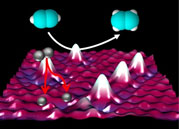
05.1.2 Surface Chemistry and Catalysis
Co-Organizers: J.R. Schmidt, University of Wisconsin-Madison (schmidt@chem.wisc.edu), and Charlie Sykes (charles.sykes@tufts.edu), Tufts University
Solid-vapor and solid-liquid interfaces provide unique chemical environments that facilitate novel molecular reactivity and dynamics. This focus session will explore the adsorption, dynamics, and reaction of adsorbates at surfaces (including metals, oxides, semiconductors, and even liquids) with a particular emphasis on systems of catalytic relevance. The session will bring together chemists, physicists, and engineers from diverse backgrounds, including surface science and catalysis, emphasizing both state-of-the-art experimental and computational approaches.
Cynthia Friend (Harvard University)
Jeff Greeley (Purdue University)
Graeme Henkelman (University of Texas-Austin)
Sulio Linic (Michigan)
Manos Mavrikakis (University of Wisconsin-Madison)
Jill Millstone (University of Pittsburgh)
Anders Nilsson (Stanford University/SLAC)
JR Schmidt (University of Wisconsin-Madison)
Feng Tao (University of Notre Dame)
Jason Weaver (University of Florida)
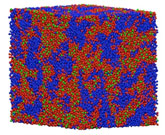
05.1.3 Solvation, Dynamics, and Reactivity in Complex Environments
Co-organizers: Amber T. Krummel, Colorado State University (amber.krummel@colostate.edu), and Valeria Molinero, University of Utah (valeria.molinero@utah.edu)
The heterogeneous chemistry and structure of materials at different length scales have a strong influence in their dynamics and reactivity. This focus session will provide a platform to bring together theoretical, computational and experimental approaches used to describe and probe solvation, dynamics, and reactivity in complex environments including multiphase, nanosegregated and crowded systems. Contributions to this symposium that will promote discussions of dynamics and reactivity in confinement, at interfaces, and across multiple length scales are encouraged.
Dor Ben-Amotz (Purdue University)
Michael Fayer (Stanford University)
Laura Kaufman (Columbia University)
Alenka Luzar (Virginia Commonwealth University)
Gil Nathanson (University of Wisconsin-Madison)
Francesco Paesani (University of California-San Diego)
Christine Payne (Georgia Institute of Technology)
Eric Potma (University of California-Irvine)
Markus Raschke (University of Colorado-Boulder)
Joan-Emma Shea (University of California-Santa Barbara)
Ward Thompson (University of Kansas)
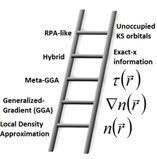
05.1.4 Recent Advances in Density Functional Theory
Co-Organizers: Weitao Yang, Duke University (weitao.yang@duke.edu), and Adrienn Ruzsinszky, Temple University (aruzsin@tulane.edu)
Kohn-Sham density functional theory (DFT) has been widely used in computations and simulations throughout engineering and sciences, because of its high computational efficiency and useful accuracy with available approximations to the exchange correlation energy functional. However, commonly used DFT approximations often fail to describe reliably band gaps of materials, weak interactions, strongly-correlated systems, and certain excitation energies. The aim of this focus session is to address these challenges.
Paul Ayers (McMaster University, Canada)
Axel Becke (Dalhousie University, Canada)
Kieron Burke (University of California-Irvine)
Aron Cohen (University of Cambridge)
Erin Johnson (University of California-Merced)
John Perdew (Temple University)
Adrienn Ruzsinszky (Temple University)
Matthias Scheffler (Fritz-Haber Institut, Berlin)
Don Truhlar (University of Minnesota)
Helen van Aggelen (Duke University)
Adam Wasserman (Purdue University)
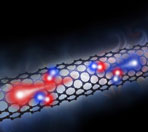
05.1.5 Charge and Energy Transfer for Renewable Energy
Co-Organizers: Xiaoyang Zhu, Columbia University (xz2324@columbia.edu), and Nathaniel Gabor (nathaniel.m.gabor@gmail.com), Massachusetts Institute of Technology
This symposium aims to advance our understanding of charge and energy transfer in molecular and nano-material systems that are being explored for future renewable energy. We will focus on novel photophysics and optoelectronic properties of these materials and strategies for the implementation of new photophysical mechanisms for solar to electric power conversion.
David Beljonne (University of Mons, Belgium)
Louis Brus (Columbia University)
Victor Klimov (Los Alamos National Laboratory)
Tim Lian (Emory University)
Paul McEuen (Cornell University)
Jiwoong Park (Cornell University)
Eran Rabani (Tel Aviv University, Israel)
Carlos Silva (University of Montreal, Canada)
Arend van der Zande (Columbia University EFRC Fellow)
Feng Wang (University of California-Berkeley)
Xiaodong Xu (University of Washington)
More information about the DCP Focus Symposia
Remembering Moshe Shapiro

We are saddened to announce the untimely passing of Moshe Shapiro on December 3, 2013. Prof. Shapiro was a pioneer in the field of coherent control. He did both theory and experiments on the control of molecular, atomic, and photonic processes with coherent light, with recent interest in quantum pattern recognition, coherent chiral separation, and the coherent suppression of spontaneous emission, decoherence and other decay processes. Prof. Shapiro was a coauthor with Paul Brumer of Quantum Control of Molecular Processes. He held the Canada Research Chair Professor in Quantum Control at the University of British Columbia at Vancouver and was the Jacques Mimran Professor of Chemical Physics at the Weizmann Institute of Science. Prof. Shapiro was the winner of the Landau Prize, the Kolthoff prize, the Weizmann Prize, and the Israel Chemical Society Prize. Moshe will be remembered by his many friends and colleagues in the chemical physics community. A contributed paper on his work will be presented by Tamar Seideman at the Quantum Control Focus Session at the 2014 March meeting.
APS March Meeting Child Care and Travel Awards
The Dependent Child Care Award (DCCA) provides funds for DCP members attending APS National Meetings. Awards may be used by recipients for dependent care at a conference, or at an alternative location (including at home), and may include those expenses incurred in transporting a caregiver. The deadline for applying for this award is January 28, 2014. Details about the application procedure are found at DCP Resources and Awards page.
The Division of Chemical Physics extends its congratulations to the following winners of travel grants to attend the March 2014 meeting in Denver:
Grant Barry (University of Illinois at Chicago)
Franziska Bell (California Institute of Technology)
Basudeb Chakraborty (Michigan State University)
Polami Dutta (Michigan State University)
Reza Farasat (University of Alabama at Birmingham)
Soumen Ghosh (Michigan State University)
Jason Goodpaster (California Institute of Technology)
Arkaprabha Konar (Michigan State University)
Joshua Kretchmer (California Institute of Technology)
Chola Regmi (Florida International University)
Yuan Zhang (North Carolina State University)
Congratulations to APS Prize Winner

The Earle K. Plyler Prize for Molecular Spectroscopy and Dynamics is administered by the DCP and sponsored by The Journal of Chemical Physics. We congratulate Lai-Sheng Wang from Brown University as the winner of the 2014 Plyler Prize, “for advancing the chemistry and physics of metal clusters using photoelectron spectroscopy, and for innovative development of cluster sources and photoelectron techniques.” Prof. Wang will present his award lecture at the March APS meeting in Denver.
DCP Election of 2014-15 Officers
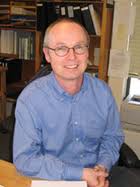
David Nesbitt
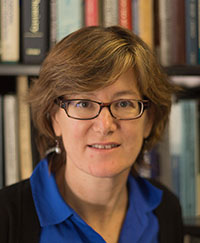
Janice Reutt-Robey
The Division of Chemical Physics congratulates David Nesbitt for his election to the office of Vice-Chair and Janice Reutt-Robey for her election to the office of Member-at-Large.
Congratulations to 2013 APS Fellows
We are pleased to announce the following new DCP/APS Fellows, who will be formally recognized at the APS 2014 March meeting:
Ilan Benjamin: For pioneering computational studies of liquid surfaces, including ion transport, energy relaxation, spectroscopy and chemical reaction dynamics at liquid/vapor and liquid/liquid interfaces
Hua Guo: For the development of iterative methods for solving the nuclear Schrödinger equation and applications to molecular spectroscopy and dynamics of various gas phase and surface reactions.
Manos Mavrikakis: For his outstanding contributions to the development and use of density functional theory in the fundamental understanding of the site-specific chemical reactions and the determination and design of new catalytic materials.
Hans-Peter Steinrueck: For his groundbreaking work on photoelectron spectroscopy of ionic liquid surfaces as well as in-situ investigations of surface reactions coupling photoelectron spectroscopy and molecular beam techniques.
Douglas Tobias: For his major contr1ibutions to the physical understanding of heterogeneous atmospheric chemistry, in particular of ions at water/air interfaces and of the molecular structure of salt solutions. Of great importance are also his findings on the hydration and molecular structure of biological membranes.
Angela Wilson: For her work in the understanding, development, and application of ab initio methods and basis sets.
J. Ilja Siepmann: For the development of efficient Monte Carlo algorithms and accurate force fields and for applications to predictive modeling of complex chemical systems
Yijing Yan: For his pioneering and seminal investigations of the fundamental theory for quantum dissipative dynamics of open systems, together with applications to the systems involved in laser manipulation and detection, time-dependent quantum transport, nonlinear optical spectroscopy, and strong electron-electron interactions.
Josef Paldus: For the development of theoretical and methodological aspects of atomic and molecular electronic structure, primarily of the unitary group and coupled cluster approaches to the many-electron correlation problem, and their exploitation in computational quantum chemistry and chemical physics.
Fellowship Committee and Nominations
The DCP extends its thanks to the 2013-14 DCP Fellowship Committee, Al Wagner (Chair), Hanna Reisler, and Scott Anderson. Nominations for 2015 APS Fellowships to be considered by the incoming DCP Fellowship Committee should be made before the deadline, which has been extended to April 1, 2014. Instructions for submitting a nomination for consideration next year are included on the DCP web site at the APS Fellowship page. Attracting and serving a diverse and inclusive membership worldwide is a primary goal for APS. In calling for nominations, we wish to remind you how important it is to give full consideration to qualified women, members of underrepresented minority groups, and scientists from outside the United States.
DCP Membership
Membership in the American Physical Society's Division of Chemical Physics allows you to directly support a primary forum for chemical physics research. The status and influence of the DCP within the APS is dependent on the number of DCP members. Increasing DCP membership is crucial to preserving this important professional asset. If you are not a DCP member, we encourage you to join on the web or by phone (301-209-3280). Remember, students get their first year of DCP membership for free.
Upcoming Conferences of Possible Interest to DCP Membership
Gordon Research Conference on Atomic and Molecular Interactions, Stonehill College, Easton Ma, July 13-18, 2014
Gordon Research Conference on Vibrational Spectroscopy, University of New England, Biddeford, ME August 3-8, 2014
The American Conference on Theoretical Chemistry (ACTC2014), Telluride CO during July 21-24, 2014, under the auspices of the Telluride Science Research Center. Support will be provided for a large number of students and postdocs. A complete list of confirmed invited speakers and conference and registration information will be available at the ACTC Participants web page.
The articles in this newsletter represent the views of their author(s) and are not necessarily those of the Unit or APS.

